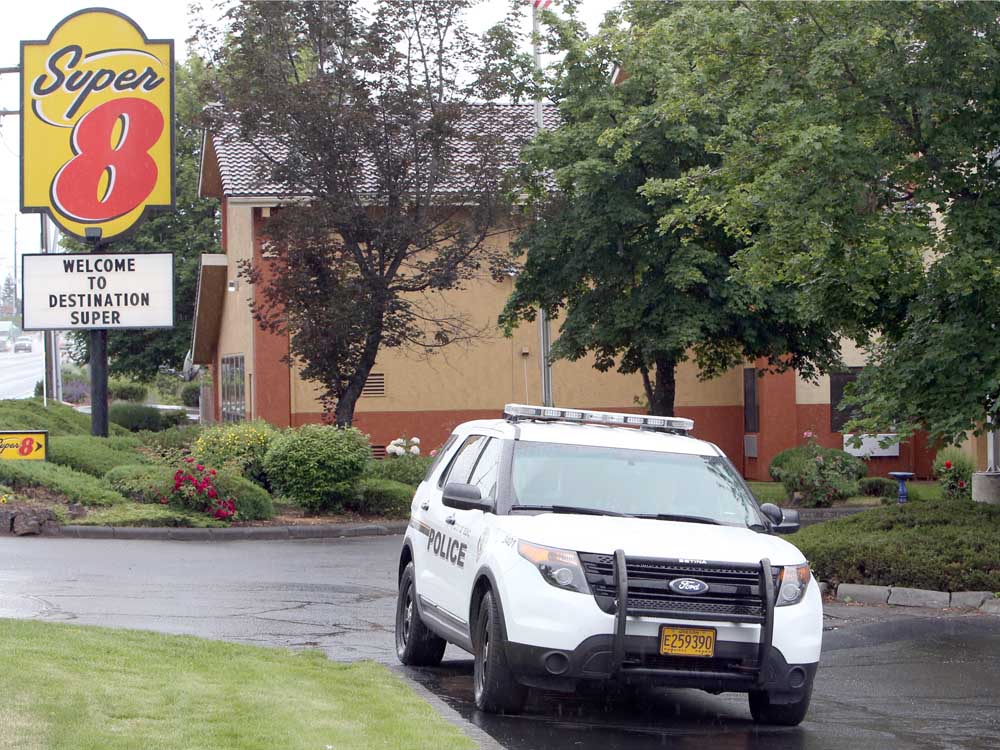For homeless mother, life’s roadblocks keep halting her progress
Published 5:45 am Sunday, April 7, 2024

- Tessy Moon shows a photo on her phone of herself with her children before they were removed from their home in NW Redmond.
After being homeless for three and half years, Tessy Moon still doesn’t feel that she’s hit rock bottom, but it’s close.
Two months ago, the Oregon Department of Human Services put three of her four children in foster care. At roughly the same time, and coincidently, her oldest child was accepted into a residential education program for homeless youth in Redmond. Her oldest child’s departure wasn’t punitive, but Moon feels the weight of being alone.
“It feels like they’re kicking me when I’m down,” said Moon, 38. “I love my children. I keep them clean and fed. I believe I am the best thing for my children.
“They love me so much and I love them.”
The Bulletin first met Moon in April 2022. When the community learned that Moon was unable to live in her manufactured home, about $18,000 poured in to help. Dirty Hands Construction & Septic volunteered its services to dig test holes and relocated a septic tank to help. NeighborImpact and Jerricho Road offered assistance as well.
Sometimes, though, even when a village steps in to help, it’s not enough.
That’s been Moon’s story. Every bit of forward progress has come with the kind of halting challenge that social welfare experts say is not uncommon for those trying to lift themselves out of homelessness.
It’s a cycle that puts up so many road blocks. Now, despite repairs to her manufactured home’s septic system, Moon has an electrical issue.
Moon, who lives in a campsite in Redmond off 17th Street near the landfill, described her current status recently at a Starbucks in Redmond. She got dressed up for the meeting, but being homeless isn’t something that is easy to wash away. There was dirt under her fingernails and in the cracks in her hands, a subtle reminder of a tough life.
Since February, Moon has focused on meeting the requirements needed to regain custody of her children. If she fails, she could lose them to either of their fathers or to foster care.
And that would be rock bottom for Moon.
“I really want to get the house and get off the public land,” Moon said. “People who are using drugs out there, are getting closer to me. People move out there because they have nowhere else to go.”
For now, social services has allowed her children to live with their 72-year-old great-grandmother in Burns, a two and a half hour drive east. While she’s separated from her children, social services is requiring Moon to take a weekly drug test, attend parenting classes and go to therapy.
“I’m tired,” said Moon. “I’m making all the appointments they’re asking for.”
Foster care
At the start of the year, Moon was depressed, overwhelmed by cascading stresses at home, she said.
Moon’s 56-year-old mother was found unconscious at her own home, sick with diabetes-related sepsis.
One of Moon’s daughters, a student at Tom McCall Elementary School, was being bullied by other students. They told the child she was dirty and smelly.
And finally, her second-oldest daughter was diagnosed as autistic as well as experiencing PTSD, Moon said.
Compounding this, the father of her youngest child was flirting online with women on his phone, even though he and Moon were living together.
And lurking in the background is her ex-husband, who was found guilty by a jury of domestic violence against Moon. He has completed his 13-month sentence and two years of probation, according to court documents. It wasn’t his first offense. Martel Moon has a number of convictions and charges dating back to 1995 that include DUII, assault, possession of methamphetamine and attempting to flee a police officer, according to court records.
Criminal history is taken into consideration when the safety of a child is at stake, but it depends on the kind of criminal background, according to child welfare advocates.
Privacy protections prevent the Oregon Department of Human Services from commenting on, or even confirming or denying the existence of cases within the child welfare system.
But Moon may have come under the scrutiny of child welfare workers while at an emergency department in the past four months with one of her daughters. It was 3 a.m., and she was tired and stressed.
Moon opened up a bit about her emotional state to one of the health care workers and at one point, fell asleep, she said. When hospital workers couldn’t wake her, they assumed she was taking drugs, Moon said.
Not long afterward, child welfare workers arrived for an unannounced inspection of her campsite. Right after that, her children were taken into foster care.
Child welfare advocates went on to label Moon as having crippling mental health.
“I haven’t had the time to work on me,” Moon said. “It’s all on me. It’s all so much for one person.”
Moon said the camper was dirty, but not terribly so. Child welfare advocates told Moon that the mattresses smelled of urine.
The homeless odyssey
What happened to Moon underscores how easily it is to become homeless — and stay there.
In 2018, when Moon was still married to Martel Moon, he was charged with domestic violence and strangulation. In November 2019, Deschutes County evicted her from the manufactured home she and Martel Moon owned on NW 35th Street because the septic tank was leaking raw sewage into a neighbor’s property, violating health and safety requirements.
The Moons also started divorce proceedings in 2019.
And then the pandemic hit, forcing people out of the office and limiting access to social services.
Tessy Moon was unable to make repairs on the manufactured home until the divorce proceedings were settled and the ownership transferred to her name. The divorce proceeding dragged on well into mid-2021, when the court granted the divorce.
Moving forward
Moon has tried to get out to Burns, a two-and-a-half hour trip, to see her children, but gas is expensive and she needs new tires and brakes on her car.
She has no job and is relying on recycling cans for income. And she doesn’t receive child support from the fathers of her children.
At the next court hearing regarding the children, on April 15, both Tessy Moon and Martel Moon have been asked to appear.
“I feel like a homeless nobody in court,” Tessy Moon said. “I feel so helpless. I want other women who have been abused to know that there’s not much help out there.”
Getting a job right now would help, but might not be easy without a permanent address or high school diploma.
Bob and AnnieBohac, a Redmond homeless advocate, first met Moon more than three years ago while offering clothing and food at a vacant lot off Antler Avenue in Redmond. What struck the Bohacs about Moon was how proud she appeared and how positive she was.
“It’s been hard to get Tessy to come out and get assistance. She’s very proud,” Bob Bohac said. “We don’t want to make the situation worse for Tessy. We want her to be safe.”
While talking to her, Bohac learned that she owned a manufactured home, but had been evicted. After The Bulletin’s story, the Bohacs placed monetary donations in an account for Moon and have used a portion of it to purchase a vehicle and pay for homeowners and car insurance.
Bohac worries that since the home has been vacant for four years, the electrical system could start a fire. Rodent droppings and rubbish are also littered throughout the manufactured home.
But the land has value. If Moon could clear out the property, the land could be sold.
Bohac said that selling the property might just be enough to get Moon and her family into a permanent home. There’s about $4,000 left in a bank account managed by Bohac to help Moon and her children start anew, he said.
Moon likes the idea. She wants to leave the camp where she lives. It’s not home. At the same time, her manufactured home reminds her of a bad marriage — even when she points out the small joys of living there, such as the marks on a wall that chronicle the growth of her children.
“I have the time now, so I can either fix up the house or sell it,” she said. “I’m trying to be positive.”
This story is the first in a two-part series that explores how one woman’s obstacles to exiting homelessness reflects how Central Oregon’s system of social services offers problems and solutions.








